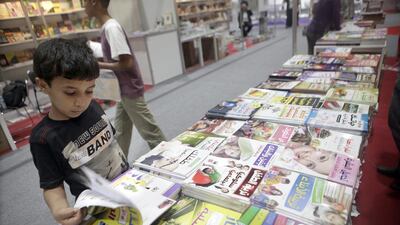Each year, Abu Dhabi and the UAE as a whole host numerous exhibitions of international import. They reflect the country’s ambition and augment its role as a global and regional hub for the cross-border flow of goods and services, people and ideas.
In terms of the number of participants and commercial weight, events such as the Abu Dhabi International Book Fair or the Sharjah International Book Fair pale in comparison to much bigger business-related exhibitions. However, that does not render them less important. Quite the contrary.
Sheikh Zayed, the UAE’s founding father, knew why: “The real asset of any advanced nation is its people, especially the educated ones, and the prosperity and success of the people are measured by the standard of their education.”
When it comes to education, books are the other side of the coin. In the course of human history, books have been the single most important medium for advancing and disseminate knowledge and skills, freedom of thought and expression.
According to the Oxford Dictionary, a book “is a written or printed work consisting of pages glued or sewed together along one side and bound in covers.” The crucial qualification here is “printed”. Books are very old. But as long as they had to be written by hand, they could only be produced in very small numbers. Consequently, reading and writing was the preserve of the privileged and powerful few.
The book as we know it was born in Germany in the 15th century when Johannes Gutenberg invented a printing press using movable metal letters. Almost overnight and on a single machine, texts could be produced in vast numbers. By medieval standards, this was a revolution comparable only to the impact of the internet on today’s world.
In conjunction with the spread of literacy, printed books enabled ever more citizens to gain access to knowledge and ideas. This had an immensely stimulating effect on science and technology. The pool of talented people that could advance the frontiers of knowledge became larger and the diffusion of such knowledge became easier. A win-win-situation that has driven progress ever since.
That goes for social progress as well. Moving from subject to citizen was greatly spurred by mass literacy and mass education, both of which were made possible and to some extent unavoidable by rolling presses churning out printed works.
Yet the revolutionary nature of reading and writing books goes much further. Storytelling is as old as mankind. It touches our hearts and addresses existential questions, it strikes emotional chords and lets our fantasy fly. Before the printing press, storytelling was largely confined to oral dissemination. With book printing, it became an easily reproducible and accessible pastime. Thus modern-day literature was born.
Then there is the fun of the act of reading. Be it parents reading to their children or an adult reading to another: the situation of togetherness and attentiveness can create a joyful bond between the persons involved.
“Just me and my book” is even more intimate. Immersing yourself in a book can refresh your mind and recharge your batteries.
Particularly in a world of rapid change, reading and – even more so – writing a book require focus and discipline. They can be hard to muster in a 24/7 online world offering constant distractions and instant gratifications. Therefore, focus and discipline as agents of scientific progress and social cohesion may be in greater need than ever.
Encouraging reading and writing is an essential means to this end. And for this it does not matter if it is a printed or an e-book.
Yet for some, like this writer, it does. Printed books have been a lifelong companion. Intellectually and emotionally, I have grown up and grown old with them. Keeping books stored on book shelves at home rather than in invisible clouds will continue to make a difference to me. So, indeed, will holding a book in my hand and turning the pages with my fingers.
Perhaps even youngsters who grow up with electronic books will come to appreciate the sensual experience of printed books. Conversely, those of us who are used to printed works will readily acknowledge the beneficial nature of the internet.
By making books available worldwide and at the click of a moment, it represents a revolution in disseminating knowledge and ideas similar to the printing press in its time.
Yet whether printed or electronic – books will continue to thrive. And so will the act of reading.
The UAE is encouraging both in this “Year of Reading” and through book fairs such as the one opening in Abu Dhabi this week.
Dr Eckhard Lübkemeier is the ambassador of the Federal Republic of Germany to the UAE

